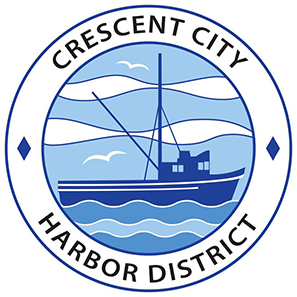Legal Notices
Notice
To Vessel Owners and Operators
- At time of seeking permit, APPLICANT must present to the Crescent City Harbor District for inspection and copying either: (1) the official marine document for documented vessels, or (2) registration certificate for non-documented vessels.
- While a person other than the owner of the vessel may initially sign the Berthing Permit and Rental Agreement, the Crescent City Harbor District reserves the right to terminate the agreement if not signed by all owners within sixty (60) days.
- A possessory interest is created by the Berthing Permit and Rental Agreement. This interest may be subject to property taxation and you may be required to pay property taxes levied on such possessory interest.
- All vessels, including documented vessels, are subject to maritime liens and foreclosure in federal admiralty court for past due berthage fees. Such a foreclosure will require you to pay all costs and attorney’s fees related to the foreclosure. These costs and fees can be many times the amount of the delinquent berthing fees. Vessels which do not hold valid marine documents issued by the United States are also subject to the Boaters Lien Law contained in California Harbor and Navigations Code sections 500 et. Seq. That law allows the Harbor District to take possession of the vessel and sell it, under the stated procedures, without seeking a court order or judgment, to satisfy the amount of any lien and costs of conducting the sale.
California law now makes it a crime, either a felony or a misdemeanor depending on circumstances, in certain cases to willfully fail to pay berthage fees. Specifically, Penal Code section 537 provides that:
Any person
- Who obtains food, fuel, services or accommodation at a marina or marine facility, without paying therefore, with intent to defraud the proprietor thereof;
- Who obtains credit at a marina or marine facility by use of any false pretense; or
- Who, after obtaining credit, food, fuel, services, or accommodations at a marina or marine facility, then (a) Absconds or (b) Surreptitiously, or by force, menace or threats, removes any part of his or her baggage there from with intent not to pay for his or her food or accommodations
Is guilty of a public offense, punishing as follows:
- If the value of credit, food, fuel, services or accommodations is $400.00 or less, by a fine of $1,000.00 and/or imprisonment in the County Jail for six (6) months;
- If the value of credit, food, fuel, services, or accommodations is greater than $400.00, by imprisonment in the County Jail for one (1) year or in the State Prison.
Evidence that a person left the premises of such marina or marine facility without paying shall be prima facia evidence
- That the person obtained such food, fuel, services, use of facilities, or accommodations with intent to defraud the proprietor
- That, if, after obtaining credit, food, fuel, services, or accommodations, the person absconded or surreptitiously, or by force, menace, or threats removed part of his baggage there from, the person did so with the intent not to pay for the credit, food, fuel, services or accommodations.
Oil Pollution
During 2005 the Crescent City Harbor District crew responded to several oil spills from boats moored in the harbor. Vessel owners must know that it is illegal to discharge any oil into the harbor. A very small amount of oil or diesel, that just causes a sheen on the water, can still result in a citation.
The vessel owner is responsible for any discharge of oil. One incident that occurred in Crescent City last year happened when a boat owner was out of town. He asked a friend to watch his boat. His friend pumped the bilge and discharged oil into the harbor. The boat owner was charged with the violation, even though he was out of town when it occurred.
Penalties and costs can be very high. The Coast Guard can impose fines of over $30,000 per day, and may even file criminal charges for deliberate or repeat offenders. The person responsible for the oil discharge is also responsible for clean up costs. If the responsible party doesn’t pay for the clean up, the Coast Guard will pay the clean up bill, and then seek to recover three times the cost from the responsible party. Between fines and clean up expenses, even a small spill can cost thousands of dollars. Vessel owners can avoid these expenses and help keep the harbor clean by taking some positive actions to minimize the chance of an oil spill. You can:
- Keep your bilge clean.
Fix leaky tanks, hoses, and connections to keep oil out of the bilge.
Use pads or absorbent material to soak up any oil that gets into the bilge. - Install pump intakes below the level where oil might be present in bilge water.
- Install Water Smart ® pump switches for automatic bilge pumps. This switch will not operate when it senses oil, so shuts the pump off.
- Install oil/water filters in the discharge line of pumps. These filters remove oil from bilge water before it is pumped overboard.
- Use oil absorbent pads or bibs when fueling.
- For recreational vessel that have overboard fuel vents, use a No Spill ® bottle on the vent during fueling.
Englund Marine sells smart pump switches, oil absorbent pads and bilge socks, Liberty Bay oil/ water filters and No Spill® bottles. None of these precautions guarantee that you won’t have an oil spill, but they are cheap compared to the fines and clean-up costs that will result if you discharge oil into the harbor. Many vessel owners should also consider purchasing pollution insurance to pay the expense if there is a spill.
